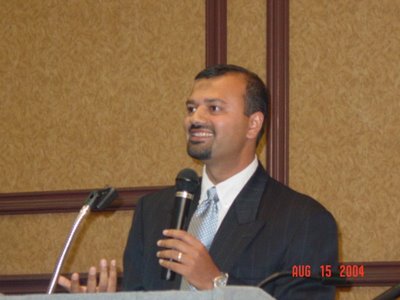Featuring me in BusinessWeek
The February edition of BusinessWeek will have an article that features your truly as an American Muslim Executive. Below is the clip. It is taken from a book written by Paul Barrett who is editor at BusinessWeek and has just completed a recent book:
American Islam: The Struggle for the Soul of a Religion
Information on the book is below the excerpt. The address for the full BusinessWeek story is: http://www.businessweek.com/magazine/content/07_03/b4017074.htm
THE EXECUTIVE
Monem Salam aims for understatement: a charcoal-gray, buttoned-down look, soft voice, and modest demeanor. But when pressed, he admits he has achieved a pretty impressive formula for combining spiritual and material interests. The 34-year-old Pakistani immigrant oversees Islamic investing for Saturna Capital Corp., a Bellingham (Wash.) firm offering Muslims mutual funds that hew to the strictures of Shariah, or traditional Islamic law. With $400 million in client money, Saturna's two Islamic stock funds are tiny by industry standards. But historically they have reported solid results. For 2006, the more conservative stock fund reported a 22% return; the more aggressive growth fund, 15%. And the mere existence of the funds and a handful of rivals are a source of pride among American Muslims, including many who don't always observe the Shariah's prohibitions.
Salam moved to Saturna in 2003, leaving behind a money manager's job in Dallas with Morgan Stanley (MS ). Nowadays he and his wife and three young children live in Bellingham, the picturesque harbor town where Saturna has its 25-person office. Salam says he is "more at peace, doing something to help Muslims and doing it in a way [with which] God would be happy."
With guidance from Islamic scholars, Salam helps shape a portfolio that excludes companies that deal primarily in alcohol, pork, or pornography. There are no gambling stocks and, most challenging, no equity in banks, because Islamic law bans the imposition or payment of interest as a form of usury. Small impurities are permitted: The funds can own airline stocks, even though flight attendants serve liquor. Lately the funds have favored technology and telecommunications. The fact that companies borrow money doesn't preclude Salam from buying their shares, but he monitors the ratio of debt to market capitalization and avoids corporations that leverage to the hilt. "You have to allow some leeway, or you can't do anything," he tells audiences at Muslim investing seminars around the country. Only a small minority of American Muslims, perhaps 15% by Salam's estimate, even attempt to follow Shariah restrictions in all of their financial dealings. His goal is to make that percentage grow.
In his spare time, Salam takes flying lessons. His father, a retired commercial pilot, flew Boeing 747s for airlines based in Pakistan and Saudi Arabia. Salam knows that after 9/11 a Muslim showing up at an American flight school could suggest something ominous to some people. That's part of the reason he's doing it: to show that Muslims can fly planes as innocuously as other Americans. Even as he sells mutual funds with an Islamic twist, he hopes his life demonstrates that "being an American Muslim is not an oxymoron." So far his flight training has gone smoothly, and Salam, whose surname means "peace" in Arabic, expects to get his pilot's license in the spring.
American Islam: The Struggle for the Soul of a Religion, by Paul M. Barrett, published on Jan. 2, 2007, by Farrar, Straus & Giroux. Copyright 2007 by Paul M. Barrett


0 Comments:
Post a Comment
<< Home